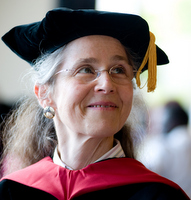Judith Wasserheit, the vice chair of UW's growing Department of Global Health, has been named the new chair of the Department effective Sept. 1. She is only the second chair since the Department was founded in 2007.

"Judy Wasserheit is exceptionally well qualified to serve as chair and we are delighted that she has accepted this very important administrative position. I look forward to working with her," said Paul Ramsey, CEO of UW Medicine and dean of the UW School of Medicine.
Wasserheit, a long-time leader in research on sexually transmitted diseases, including HIV, will succeed Professor King Holmes, the first William H. Foege chair of the Department of Global Health.
As chair, she will oversee one of the largest departments on campus. It includes 344 faculty from schools across UW working on projects in more than 130 countries. Last year, more than 300 students were enrolled in the global health graduate program, 171 students declared an undergraduate minor in global health and 1,000 students took global health courses.
The Department, established in the schools of medicine and public health, has been a catalyst bringing together faculty and students across campus to create solutions to lessen poverty and health disparities worldwide.
"The field of global health is evolving rapidly," said Howard Frumkin, dean of the School of Public Health. "The traditional focus has been on infectious disease, but chronic disease, mental health, global environmental health and road traffic injuries are among the rapidly emerging priorities. Judy's extraordinary thoughtfulness, broad interests and global leadership roles position her perfectly to lead the department in innovative directions."
Wasserheit, a UW professor of global health, medicine and epidemiology, has played a central role in the development of the Department and has deep roots at the UW. During her research fellowship in infectious diseases with Holmes (1982 to1984), she worked with Elaine Jong, emeritus clinical professor of medicine, to co-found the Harborview Medical Center Southeast Asian Refugee Clinic, now known as the International Medicine Clinic. In 2001, she returned to UW as faculty when she became director of the HIV Vaccine Trials Network at the Fred Hutchinson Cancer Research Center, the largest global-clinical-trials platform evaluating preventive HIV vaccines.
Wasserheit is a graduate of Princeton University and Harvard Medical School and received her master's in public health from Johns Hopkins University. Her passion for global health grew in medical school after spending two months providing primary care at a rural hospital in Colombia. As a house officer at Columbia Presbyterian Medical Center in New York, she trained in both surgery and internal medicine. She did her senior residency at Emory University and then put her medical skills to work in the emergency ward at Khao-I-Dang, then the largest Khmer refugee camp on the Thai-Cambodian border.
Wasserheit brings extensive research, program and policy experience in low and middle-income countries -- including Bangladesh, Colombia, Egypt, Indonesia, Kenya, Thailand and Zambia – as well as the United States. From 1984 to 1986, she worked as an infectious disease research physician at the International Centre for Diarrhoeal Disease Research in Bangladesh, where she conducted the first population-based study of reproductive tract infections in the Indian subcontinent. She returned to the United States to join the faculty of Johns Hopkins School of Medicine and served as both assistant chief of sexually transmitted disease clinical services at the Baltimore City Health Department and medical director of the Druid STD Clinic in Baltimore – a transfer of knowledge and experience now commonly called "global to local."
At just 34, Wasserheit became the founding chief of the National Institutes of Health's STD research branch. Three years later, she was recruited to lead the Centers for Disease Control and Prevention's Division of STD/HIV Prevention, a position she held for a decade that put her at the center of STD/HIV prevention.
She has led or served on numerous World Health Organization and UNAIDS committees and advisory groups. Her honors include the U.S. Department of Health and Human Services Presidential Meritorious Rank Award, the Infectious Diseases Society of America's Edward E. Kass Award and the American Social Health Association's Presidential Award. She is a member of the Institute of Medicine and the American Epidemiological Society. She is also a Paul Rogers Society global health research ambassador and a founding member and past chair of the Consortium of Universities for Global Health.
"This is a time of extraordinary opportunity and unprecedented need in global health," said Wasserheit. "During the last seven years, thanks to our outstanding faculty, staff and students, our remarkable partners internationally and at home, and King's exceptional leadership, the University of Washington's Department of Global Health has become one of the premier academic programs in the world. It is a tremendous honor and privilege to be asked to lead the Department as we enter the next phase of development and recommit to working together on evidence-based approaches to improve health and health equity around the world."
In looking for a new Department chair, a large search committee – including faculty, students and representatives from the Gates Foundation and the Washington Global Health Alliance, cast a broad net and received 21 applicants from six countries. Three finalist candidates visited campus. After reviewing extensive input from internal and external stakeholders, the committee named Wasserheit as the leading candidate.
